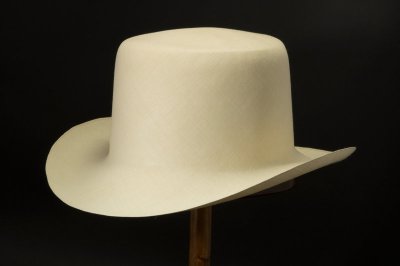http://www.npr.org/sections/goatsan...er-a-portrait-of-the-worlds-finest-panama-hat

"Would like to have seen a photo of the completed hat."
That's what one commenter noted when we ran a story on Aug. 8: "He's Just Woven The World's Finest Panama Hat. But Who Will Buy It?"
Now, we did have a nice photo of the hat weaver himself, Simon Espinal, who lives in Pile, a village hidden in the hills of Ecuador's coastal lowlands.
Weaving is only the first step. From the weaver the hat passes through the hands of a series of artisans with Hemingway-esque titles: the rematador, the cortador, the apeleador and the planchador.
GOATS AND SODA
He's Just Woven The World's Finest Panama Hat. But Who Will Buy It?
And there is a close-up of the top portion of the hat, which gives a pretty good idea of what it looks like.
But yes, the commenter was right. We did not show a portrait of the completed hat in its entirety. Our bad!
So we asked for a photo. And it turns out that the hat cannot be 100 percent finished until someone buys it. Our hat correspondent, Roff Smith, gave us the lowdown:
After months of weaving and passing through the hands of several specialist finishing artisans in the town of Montecristi, the masterpiece hat woven by Simon Espinal is still a work in progress — a blank canvas, if you will, awaiting the blocker's art.
It is the job of the hat blocker — in this case hatter Brent Black — to fashion the hat body into one of the various styles we know and recognize as a Panama hat: the classic fedora (think of the cafe scene in Casablanca), or the Optimo — the original globetrotter's Panama from the 19th century (Mark Twain liked these) — or maybe the Havana.
Panama hats can come in many shapes and styles. The final choice will be up to the buyer, which is why the hat body is not blocked or sized yet. Blocking these hats is always done to the specific measurements and tastes of the client.

"Would like to have seen a photo of the completed hat."
That's what one commenter noted when we ran a story on Aug. 8: "He's Just Woven The World's Finest Panama Hat. But Who Will Buy It?"
Now, we did have a nice photo of the hat weaver himself, Simon Espinal, who lives in Pile, a village hidden in the hills of Ecuador's coastal lowlands.
Weaving is only the first step. From the weaver the hat passes through the hands of a series of artisans with Hemingway-esque titles: the rematador, the cortador, the apeleador and the planchador.
GOATS AND SODA
He's Just Woven The World's Finest Panama Hat. But Who Will Buy It?
And there is a close-up of the top portion of the hat, which gives a pretty good idea of what it looks like.
But yes, the commenter was right. We did not show a portrait of the completed hat in its entirety. Our bad!
So we asked for a photo. And it turns out that the hat cannot be 100 percent finished until someone buys it. Our hat correspondent, Roff Smith, gave us the lowdown:
After months of weaving and passing through the hands of several specialist finishing artisans in the town of Montecristi, the masterpiece hat woven by Simon Espinal is still a work in progress — a blank canvas, if you will, awaiting the blocker's art.
It is the job of the hat blocker — in this case hatter Brent Black — to fashion the hat body into one of the various styles we know and recognize as a Panama hat: the classic fedora (think of the cafe scene in Casablanca), or the Optimo — the original globetrotter's Panama from the 19th century (Mark Twain liked these) — or maybe the Havana.
Panama hats can come in many shapes and styles. The final choice will be up to the buyer, which is why the hat body is not blocked or sized yet. Blocking these hats is always done to the specific measurements and tastes of the client.


